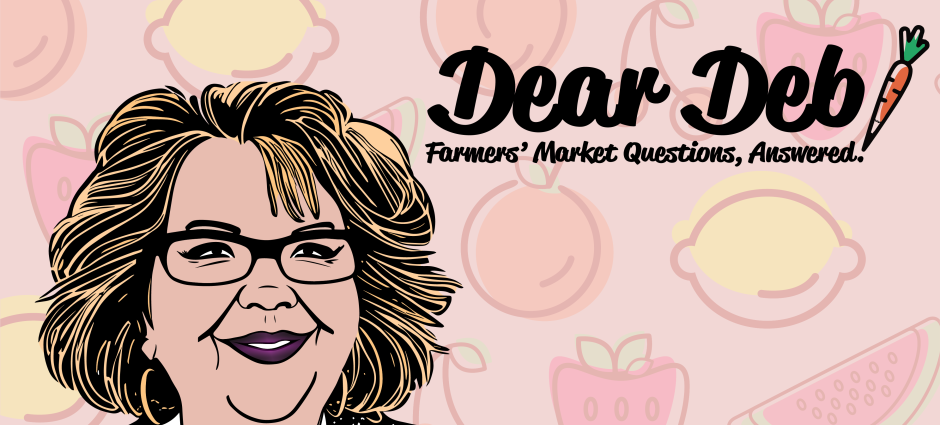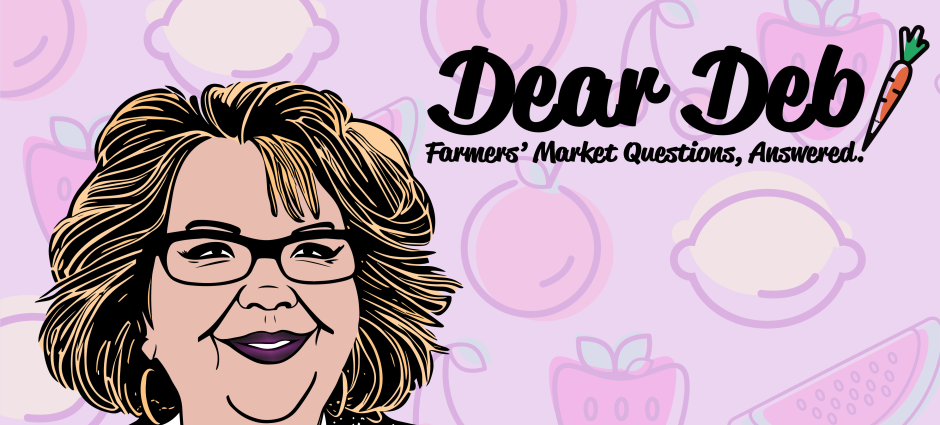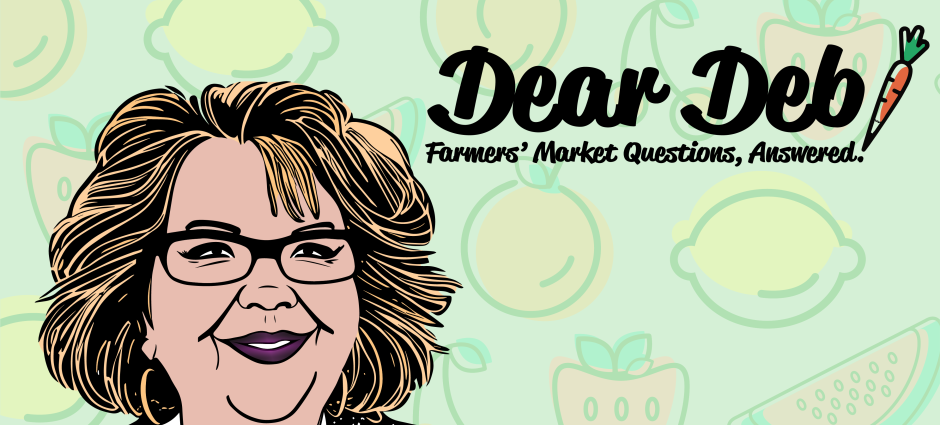Dear Deb - June 2023
Dear Deb: Why does farmers’ market produce cost more than grocery stores? – Stephanie K., Walnut Creek
Answer: Well, let me start by saying that this is a common misconception. Many factors that go into putting a price on fruits and vegetables. It depends on where you shop, what you’re purchasing, and whether or not you’re buying produce in season. Various environmental factors like the weather come into play, as well as the economy. Shop at high-end markets and you’ll spend more than at the farmers’ market, while grocery store chains and club stores are more in line with seasonal market prices.
An important distinction is that purchasing from the farmers’ market means that you are only buying California-grown produce, during its ripe season, directly from the farmer that grew it. Big box grocery stores are often selling products they’ve purchased wholesale from farms in other countries, cutting production costs by shipping the product in bulk from overseas.
Another factor in produce pricing is whether it’s organic or not. Organic farming is more expensive for the farmer due in part due to the costs of inspection and certification. Organic farms need to put much more into the same yield of produce grown conventionally, due to the inherent labor-intensive growing processes. Additionally, the difference between conventional produce and organic is that non-organic produce has been bred or modified to produce a greater yield, be more bug and drought resistant, and mature at a faster rate. Without these advantages, organic produce earns its place at the table through clever growing practices and sheer determination.
There are some distinctions between farmers’ markets and grocery stores. Grocery stores can be more accessible than farmers’ markets because they’re open every day. To make more profit they offer a variety of produce year-round. Half of this produce is not in season and comes from countries in the southern hemisphere like Mexico and Chile where the seasons are opposite to California’s.
Farmers’ markets are open once or twice a week. They offer fruits and vegetables that are currently in season and come from local farmers who grow and harvest the produce themselves, delivering quality, flavor, nutrition, and freshness that beats grocery stores and club stores every time.
We wanted to test the long-held theory that farmers’ markets are more expensive, so this month we snooped around grocery stores and local farmers’ markets to check out the price differences. We chose to compare prices on those products that are purchased most often by our customers like the basics – lettuce, onions, potatoes, fruit, and other staples. We also looked at some seasonal produce like cherries and peaches.
First up, the basics. Carrots, celery, onions, and potatoes were compared, costing about $2.00 per pound at farmers’ markets and at grocery stores. This is not a surprise since these items are grown year-round and are easy to grow. But we noticed that the onions at high-end grocers were grown in Mexico, not ideal if you are concerned about buying locally.
Fresh strawberries ranged from $12 to $15 per 3-pack at farmers’ markets, with one market selling organic strawberries for $14 per 3-pack. A 2-lb pack of strawberries at a grocery chain store was on sale for $5.99, about 1.5 pints.
We found cherries, a seasonal product, going for $8 a pound at several farmers’ markets. High-end grocers are charging $8.99 per pound. Grocery chains are selling them for $9.98 lb. Each grocery store stated their sources were grown locally. A pint of fresh blueberries from high-end grocers was priced at $6.49 per pint on sale (usually $8). A chain grocer was selling a pound of blueberries for $3.97 to card members. Farmers’ market handpicked blueberries vary from $8 to $10 per pound.
The results of our quick-and-dirty survey showed that most items were compared favorably, with some farmers’ market produce trending less expensive and some more than grocery stores. Seasonal fruit can vary widely, depending on whether it’s sourced locally or brought up in mass from other countries.
Though prices compared reasonably well, we want to emphasize that price isn’t the only thing you should consider when buying fruits and vegetables. Your local farmers’ market offers many advantages for your family’s health, the environment, and the local economy that other big retailers simply do not. Besides helping our local economy, quality and freshness are a large part of shopping at the farmers’ market. Farmers pick their produce the day before they arrive at a farmers’ market, while grocery stores ship in their produce from long distances, especially for those products that are off-season like tomatoes in the winter or grapes in the spring. Those come all the way from South America and other locations. Talk about an excessive carbon footprint!
Additionally, many farmers' markets accept SNAP benefits, making farmers’ markets more accessible to the public. All PCFMA’s Farmers’ Markets participate in the Market-Match program, allowing them to not only accept EBT benefits, but increase the budget families have for fresh fruits and vegetables.
Californians are so used to having everything available year-round that we don’t stop considering how it gets to our stores and plates. Consider eating with the seasons and waiting just a bit for the first bite of a summer peach or a crisp fall apple. You will savor each spectacular bite – we guarantee it!
When you make your decision where to shop for produce, consider the quality, freshness, and your family’s health. Shop the farmers’ market and you can reduce your carbon footprint, help local farmers, and help your community!


